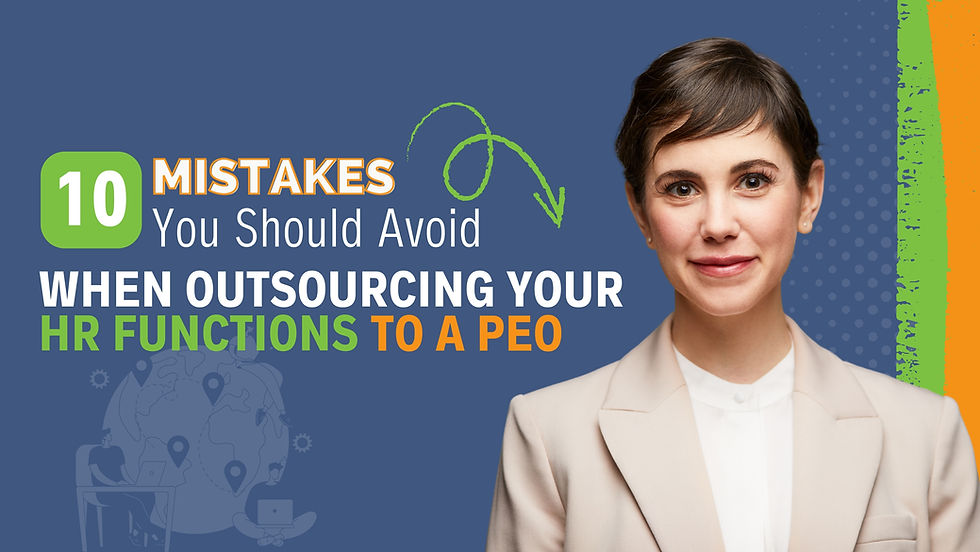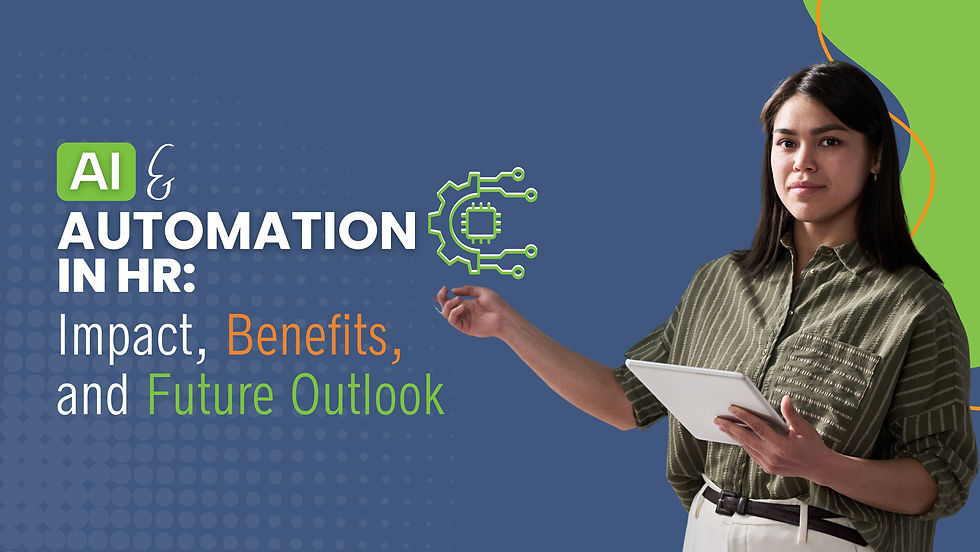5 Advantages Nonprofits See when Partnering with a PEO
- Elijah

- Jul 19, 2024
- 5 min read

A Professional Employer Organization (PEO) is a firm that provides comprehensive HR solutions for businesses of all sizes. These services often include payroll processing, employee benefits management, regulatory compliance assistance, and other HR administrative tasks. By partnering with a PEO, organizations can outsource these critical functions to experts, allowing them to focus more on their core operations and strategic goals.
For nonprofits, the decision to partner with a PEO can be particularly advantageous.
Nonprofits often operate with limited resources and must maximize every dollar to achieve their missions. The administrative burden of managing HR functions, staying compliant with ever-changing regulations, and offering competitive employee benefits can divert valuable time and resources away from mission-driven activities. This is where a PEO can make a significant difference.
By leveraging the expertise and services of a PEO, nonprofits can streamline their HR processes, ensure compliance with complex employment laws, and gain access to high-quality benefits packages at more affordable rates. This PEO partnership not only helps in reducing operational costs but also enhances your organization's ability to attract and retain top talent.
In this blog post, we will explore five key advantages that nonprofits can see when partnering with a PEO.
Benefits of Partnering with a PEO
1) Access to Better Employee Benefits

Nonprofits often face significant challenges when it comes to offering competitive employee benefits. Limited budgets and financial constraints can make it difficult for these organizations to provide attractive benefits packages that rival those offered by larger corporations. This can result in difficulties attracting and retaining skilled employees, as potential and current staff may seek opportunities with more comprehensive benefits elsewhere. Additionally, negotiating and managing benefits packages can be a complex and time-consuming process, further straining the already limited administrative resources of your nonprofit.
Partnering with a PEO can dramatically improve the quality and cost-effectiveness of the benefits packages available to nonprofit employees. PEOs have the advantage of pooling their clients' employees to negotiate better rates and more favorable terms with benefits providers. This means that nonprofits can access high-quality health insurance, retirement plans, and other essential benefits at costs that would be unattainable if they were negotiating on their own.
The PEO handles the intricacies of benefits administration, from enrollment to compliance, ensuring that employees receive the support they need without overburdening the nonprofit's administrative staff. Offering robust health insurance, retirement plans, and other benefits can make a nonprofit a more appealing place to work, helping to draw in highly qualified candidates who are passionate about your organization's mission.
2) Enhanced Compliance & Risk Management
Nonprofits operate in a complex regulatory environment that requires strict adherence to various employment laws, tax regulations, and industry-specific requirements. These regulations can be challenging to navigate, particularly for organizations with limited administrative resources. Non-compliance can lead to severe penalties, legal disputes, and damage to the nonprofit’s reputation and mission activities.
Partnering with a PEO brings the advantage of specialized expertise in managing compliance with these intricate regulations. PEOs are well-versed in federal, state, and local employment laws and stay current with any changes that may affect their clients. This expertise extends to handling tax regulations, including payroll taxes and filings, as well as ensuring compliance with industry-specific requirements that may apply to certain types of nonprofits. PEOs essentially help nonprofits avoid costly mistakes and legal issues.
PEOs also play a vital role in risk mitigation by providing comprehensive employee management solutions. They assist in creating and implementing workplace policies that promote a safe and compliant work environment. For instance, PEOs can offer guidance on employment practices, employee relations, and dispute resolution, helping nonprofits and other small businesses to minimize the risk of employee grievances and lawsuits.
3) Long-term Cost Containment
As you already know, working at a nonprofit can be challenging due to budgetary constraints, making it difficult to cater to all operational costs every time. But, you still must account for every single dollar right down to the last penny. You spend endless hours requesting grants, seeking out new donors, and fundraising for future projects. So, you don't want to spend these monies without judicious budgeting.

Partnering with a PEO can lead to substantial cost savings through economies of scale. PEOs serve multiple clients and, therefore, can pool the purchasing power of all their clients to negotiate better rates for benefits, insurance, and other HR services. This collective bargaining power allows PEOs to secure more favorable terms and lower prices than individual nonprofits could achieve on their own. In the long term, partnering with a PEO can lead to significant and sustained cost savings.
4) Streamlined HR Processes
Nonprofits often face significant HR challenges, primarily due to limited resources and the substantial administrative burden associated with managing HR functions. Many nonprofits operate with small teams, where employees may wear multiple hats, including handling HR responsibilities. This can lead to inefficiencies, errors, and a lack of focus on the organization’s core mission. These tasks can be overwhelming and time-consuming, diverting valuable time and resources away from mission-driven activities.
Partnering with a PEO can alleviate these HR challenges by providing comprehensive HR services tailored to the needs of nonprofits. PEOs take on the responsibility of payroll processing, ensuring accurate and timely payments while managing tax withholdings and filings. They also handle benefits administration, from negotiating benefits packages to managing employee enrollments and claims. Furthermore, PEOs offer support in employee relations, including performance management, conflict resolution, and training and development programs.
5) Focus on Mission-Driven Work
For nonprofit organizations, the primary focus is always on advancing their mission and making a meaningful impact in their communities. However, the administrative burden of managing HR functions can often divert attention and resources away from these mission-critical activities. Partnering with a PEO allows nonprofit organizations to offload these back-office functions to a team of HR experts, freeing up valuable time and resources.

This support enables nonprofit leaders to concentrate on strategic planning, program development, fundraising, and community outreach, rather than getting caught up in administrative details. With a PEO managing the intricacies of HR, nonprofit staff can focus on what they do best: driving their mission forward and creating positive change.
With the administrative burden lifted, the organization's leadership could also devote more time to securing grants, developing new initiatives, and building partnerships.
Finding a Reliable PEO Partner
Now that you know the tremendous benefits of partnering with a PEO, it's time to find a suitable PEO that will help you unburden the load of administrative tasks within your nonprofit, so you and your team can commit your precious time to your core mission goals.
With a partner in the PEO business like The Mission, you can let us deal with all the subtleties surrounding your search for HR, recruiting, benefits, payroll, compliance, and much more. We achieve this with our team of experts with over 40 years of combined experience who are committed to getting you the best options, at the best price, every time.
For instance, one nonprofit organization that partnered with a PEO reported a significant reduction in administrative workload, allowing their HR team to focus on strategic initiatives rather than routine administrative tasks. Another nonprofit experienced improved accuracy and compliance in payroll processing, reducing the risk of errors and penalties.
For a first-class HR experience that will help you find the best solution for your needs, let's schedule some time to talk today.
About The Mission
The Mission is a leading partner in the PEO, HR, payroll, and benefits outsourcing marketplace. We provide a valuable service for small and medium-sized organizations and government contractors, serving as a trusted partner in integrated human resource (HR) compliance, risk management, employee benefits, employment practices liability insurance (EPLI), and payroll processing.



